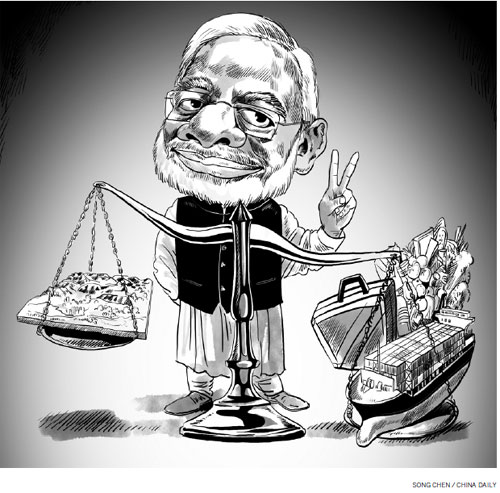How good a govt India has got
By OP Rana (China Daily) Updated: 2014-05-19 10:49

On the environmental front, too, Gujarat doesn’t fare any better. Three of India’s 10 most polluted cities, according to the country’s central Pollution Control Board, are in Gujarat. Vapi, Ankaleshwar and Vatva are not only the three most polluted cities in India, but also the provincial government under Modi didn’t take any action when environmental norms were openly violated in these and other cities in the province.
But the Indian voters, by and large (by and large, because the percentage of votes the BJP has got is much less than half of the total) have accepted Modi as a person who could change the economic and strategic fate of India. The question, however, is: Is Modi really a wizard? Or does he owe his larger than life image to the media and big business?
Modi has been accused of being complicit in the killings of more than 1,000 Muslims in the riots that rocked Gujarat in 2002. Besides, his alleged favorable disposition toward big business at the cost of farmers and small businesspeople is another contentious issue that does not suit a national leader.
Given these facts, what should the world, especially United States and China, expect from Modi as the new leader of India? The new government will, at least to prove its worth to its supporters and the electorate in general, will have to take some steps to repair the Indian economy. But since the BJP is politically and economically disposed toward Washington, we can expect Modi to lean more toward the US than Russia (India’s traditional ally).
And the fact that the BJP-led government is likely to focus on trade and investment promotion should be good news for India’s major trade partners. Using foreign policies to tide over domestic problems is not new in international relations — many countries do it, and India is no exception. And this could very well be one purpose the BJP-led government could use the border dispute with China. At least it could use it to drive a hard bargain — because it has to impress its supporters by trying to reduce the huge trade deficit with China.
But since the new Indian government’s agenda is likely to be set by big business (as a possible quid pro quo for supporting Modi’s candidature), trade may take precedence over geopolitics and even realpolitik. The new Indian government may not be as bad a news for its trade partners as it is for the Indian economy and society.
The author is a senior editor with China Daily
oprana@hotmail.com











